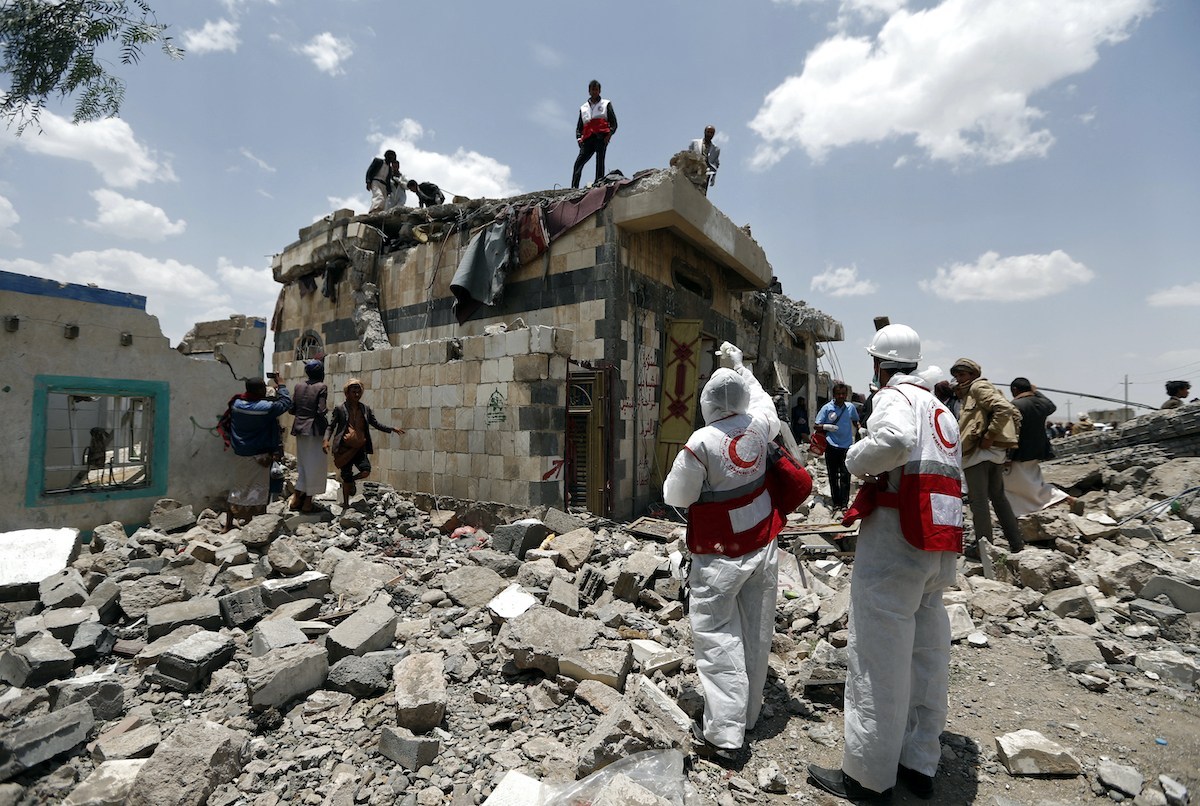[ad_1]
Both the Biden administration and Italy have clamped down on arms sales to Saudi Arabia and the UAE ostensibly because of human rights concerns over Yemen.Â
But the reasons behind the decisions of each country have a possibly different basis: in the US, Biden is anxious to undo anything with former President Trump’s name on it, even if it means risking America’s posture in the Middle East.
In Italy, the decision may be to protect its largest defense company, Leonardo SpA. There is more than meets the eye in these decisions and the reasons are bigger than human rights in Yemen.
On January 28, the Biden administration announced a pause in arms sales to Saudi Arabia and the UAE. The pause at least temporarily stopped the sales of advanced F-35 stealth jets to the UAE and billions of dollars in precision-guided munitions to Saudi Arabia.
Ostensibly the reason for the “pause†was because of UAE and Saudi involvement in Yemen and the large number of civilian casualties. Many civilians have been killed by Saudi-UAE bombing campaigns against Houthi fighters.
On the other hand, it was known perfectly well by the Biden administration that the F-35 sales were linked directly to the Abraham Accords, which established diplomatic ties between Israel and the UAE and where the United States acted as a formal broker and backed the F-35 sale.Â
The Biden administration chose to ignore US responsibilities and undertakings in the three-way accord, an action that does little to enhance either US prestige or, more importantly, its reliability.Â
Italy cancels licenses
In this context, the Biden decision harks back to a plethora of US decisions that have sold out allies and friends over the years, such as the Shah of Iran.
Meanwhile, less than three weeks later, Italy canceled six different arms export licenses to Saudi Arabia – mainly licenses for 20,000 Mk 82 and Mk 84 bombs manufactured in Domusnovas, Sardinia, by RWM Italia S.p.A, owned by the German Rheinmetall Defence Group.Â
Those licenses were originally approved by the Italian government in 2012, 2013 and 2014.Â
The Mk 82 is a 500lb convention “iron bomb†and the Mk 84 is 2,000 pounds. The bombs can be fitted with two different types of kits that turn them into precision-guided weapons.
One kit is called Paveway, which comes in different forms but uses a laser designator to strike a target. The other kit, known as the JDAM, pronounced Jay-Dam for Joint Direct Attack Munition, is a precision guidance kit that features an inertial guidance system and GPS.
Saudi Arabia and the UAE have purchased thousands of these kits in the past and used them extensively in the bombing campaign in Yemen.
Precision guidance kits are available from non-US sources including HGK in Turkey, AASM “Hammerâ€Â from France (already exported to Qatar, one of the Coalition Partners), and FT-PGB from China, a reverse-engineered JDAM.Â
Israel also produces a less expensive bomb kit called Spice, but until recently did not have a relationship with either the UAE or Saudi Arabia.
Ulterior motive
Not only is the Italian cancellation of these licenses far more definitive than the US “pause,†but it has an ulterior motive. Coursing through the Italian courts is a legal action based on a complaint against the use of the Italian-made bombs in Yemen that killed a Yemeni family in 2016 in a northern Yemeni town called Derial-Hajari.Â
The proof allegedly is portions of the bomb that have been recovered with markings linked to the German-owned Italian company.
The complaint was brought by the European Center for Constitutional and Human Rights, based in Berlin, a Yemen-based NGO called Mwatana for Human Rights and the Italian Peace and Disarmament Network. These and other groups are also pressing court action in the European Union.
Initially filed in 2018, the case was opposed by the Rome Public Prosecutor and dropped. However, a Rome judge decided on February 22 that the case should go forward because of human rights concerns.Â
The complaint aims at RWM Italia and its management – including its Rheinmetall owners – and also senior officials of the Italian licensing authority (UAMA), which belongs to Italy’s Foreign Ministry. All are accused of violating the human rights of Yemeni civilians.
There have been countless complaints about civilian casualties in Yemen and the alleged complicity of arms makers and governments, including the US, UK, Germany and Italy.
It may be that the Italian government, by canceling the arms sales to Saudi Arabia, was seeking to pre-empt the Italian courts from deciding the Derial-Hajari case. Had the court sided with the plaintiffs, much more would be involved than a single case.Â
‘Unequal treatment’
A court decision could establish that defense companies and government officials, specifically export licensing officials, are responsible and culpable if the licenses and equipment are used in cases where there are violations of human rights.
The Italian bomb manufacturer RWM Italia has protested the Italian government decision which was made just as the previous government left office. The CEO of RWM, Fabio Sgarzi, said the government decision was political and discriminatory, claiming that “unequal treatment compared to other Italian companies in the defense sector is also incomprehensible …â€Â
In fact, Sgarzi has a point since Italian companies, including Leonardo, Italy’s premier aerospace and defense conglomerate, sell to both the UAE and Saudi Arabia. But the government may believe that by sacrificing the little guy – and in this case a company with foreign ownership – it can protect its major players such as Leonardo.Â
Indeed, some evidence for this is the fact that Leonardo is owned 30% by the Italian government which, in reality, has full control of the company’s Board of Directors because it nominates its members.
Full Disclosure: Stephen Bryen was President of Finmeccanica North America, now Leonardo.
[ad_2]
Source link













